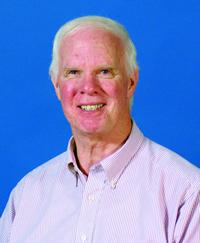Remembering Dr. Leach
Sometime around 1983 I was fortunate enough to audit a class at the Goergia Institute of Technology given by the late Dr. W. Marshal Leach Jr. (1940 - 2010). That man literally taught me all that I know and all that I have forgotten about loud speaker design. Though I was far too young and mathematically inexperienced to follow the class numerically I gained enormous knowledge and lifelong interest in the electronics and mechanics of music reproduction in the home.
Dr. Leach's paper, Build a Low TIM Amplifier published in Audio Magazine in February, 1976 was a turning point in solid state amplifier design. It is not unfair to call it the single most successful solid state amplifier design ever if we may include all the manufacturers who took the ideas presented if not verbatim at least included each of the sections with some twist here and there. From Bryston to Yamaha. No design in the history of discrete solid-state amplifiers has ever been produced by as many manufacturers.
So in these pages I will offer up my heartfelt thanks to Dr. Leach and the Georgia Institute of Technology for allowing me to steal what I did like a giddy thief. It is partly in gratitude, partly in regret I was never able to thank him properly. To paraphrase, poorly, Harvard University president Drew Faust:
Universities have responsibilities and capabilities far beyond being degree and job creating machines
What follows therefore is my own humble example and thanks for that truth and the part that Dr. Leach played for me.
The Speaker Plans
I humbly present the plans for a series of DIY speakers, the Leach Memorial series, free of charge. The series is comprised of three similar designs:- LM-1 - Classic 2-way bookshelf using a 1" ring radiator matched to a 5 1/4" woven fiberglass mid-woofer in a ported Dayton cabinet. Small speakers suitable for intimate listening and surrounds. About $300 - $470 per pair depending on cabinet and crossover parts.
- LM-1C - The MTM (mid-tweeter-mid) version suitable for main, center and surround duties. Also integrates well with most subwoofers. About $350 each.
- LM-1S The super simple, single driver version of the LM-1. $190/pair

Sound Quality
The LM-1/LM-1C share a frequency range from around 60 Hz to flat past 20 kHz. The liveliness of the midrange in addition to a butter-smooth response is outstanding in the price class. It's pretty expressive without being forward, so they sound closer to really good three way speakers. The ring-radiator tweeter makes the treble sound easy and smooth, but the tight dispersion gives clarity at the expense of a big, diffuse sound field which some may miss without more diffusion in the room.This is a really open and neutral sounding speaker, free of gimmicks or hype. Of course, I would say that as the creator, but hey, it's not like I'm making money here. Take my views as the rantings of a proud designer.
Please build, learn and share these designs freely, and if you find this information helpful or inspiring please give a little thanks to Dr. Leach.
The just-released LM-1C does not have the absolute fidelity to the top three octaves of the LM-1/LM-1C, but it is very nice and definitely worth the price to build and experience you'll gain. If you are considering a 5.1 system, the LM-1S would be ideal surround speakers.
Disclaimer
Except as noted above, I am in no way affiliated with Dr. Leach or the fine Georgia Institute of Technology. All the technical mistakes I will undoubtedly make are mine and mine alone.Further Reading
As of January, 2016 several books published by Dr. Leach are still available directly through Kendall Hunt Publishing. in the "Higher Ed" section but not easily from Amazon. I believe they are of general audio interest (amplifiers, speakers, op amps, etc.) as opposed to being specifically about loudspeakers.Dr. Leach's resource pages are still maintained at the Georgia Tech website here, including his notes on audio related things here.
More specific to loudspeakers and relevant to all the discussions about speaker measurements is Dr. Joseph D'Appolito's often cited Testing Loudspeakers.

No comments:
Post a Comment